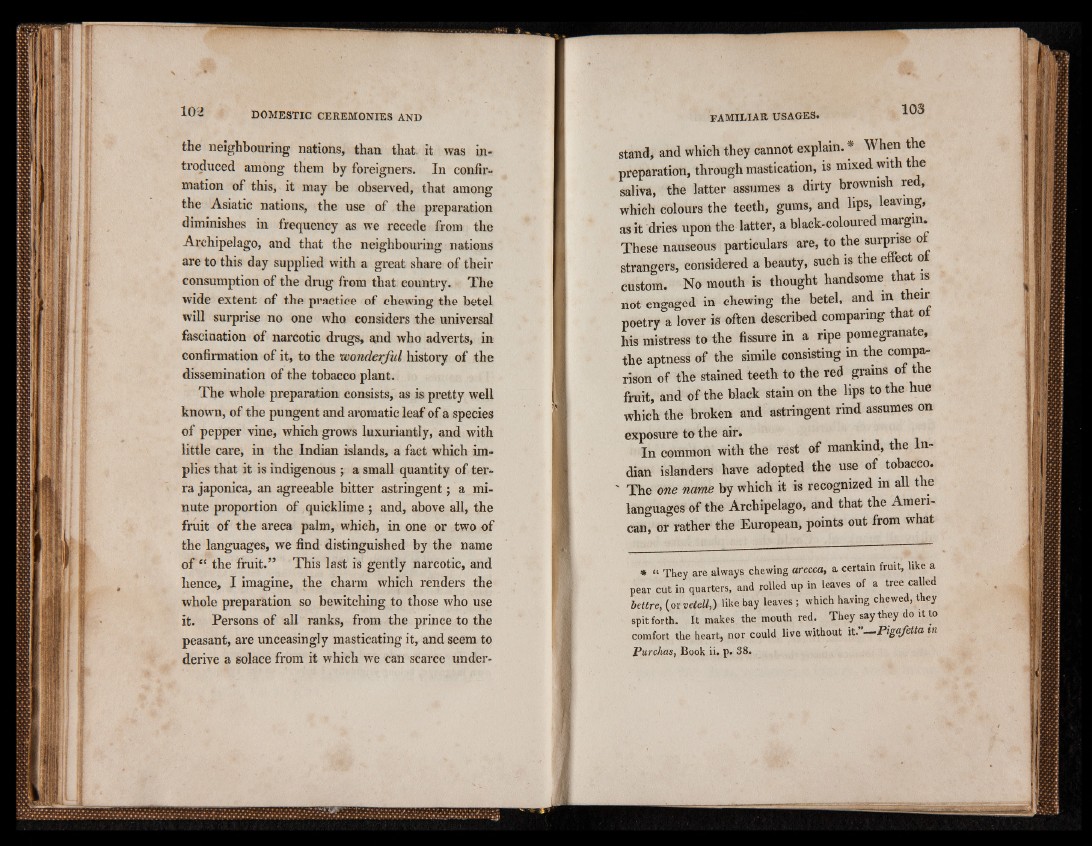
the neighbouring nations, than that it was introduced
among them by foreigners. In confirmation
of this, it may be observed, that among
the Asiatic nations, the use of the preparation
diminishes in frequency as we recede from the
Archipelago, and that the neighbouring nations
are to this day supplied with a great share of their
consumption of the drug from that country. The
wide extent of the practice of chewing the betel
will surprise no one who considers the universal
fascination of narcotic drugs, and who adverts, in
confirmation of it, to the 'wonderful history of the
dissemination of the tobacco plant.
The whole preparation consists, as is pretty well
known, of the pungent and aromatic leaf of a species
of pepper vine, which grows luxuriantly, and with
little care, in the Indian islands, a fact which implies
that it is indigenous ; a small quantity of terra
japónica, an agreeable bitter astringent; a minute
proportion of quicklime ; and, above all, the
fruit of the areca palm, which, in one or two of
the languages, we find distinguished by the name
of “ the fruit.” This last is gently narcotic, and
hence, I imagine, the charm which renders the
whole preparation so bewitching to those who use
it. Persons of all ranks, from the prince to the
peasant, are unceasingly masticating it, and seem to
derive a solace from it which we can scarce understand,
and which they cannot explain. * When the
preparation, through mastication, is mixed with the
saliva, the latter assumes a dirty brownish red,
which colours the teeth, gums, and lips, leaving,
as it dries upon the latter, a black-coloured margin.
These nauseous particulars are, to the surprise o
strangers, considered a beauty, such is the effect o
custom. No mouth is thought handsome that is
not engaged in chewing the betel, and m their
poetry a lover is often described comparing that ot
his mistress to the fissure in a ripe pomegranate,
the aptness of the simile consisting m the comparison
of the stained teeth to the red grains of the
fruit, and of the black stain on the lips to the hue
which the broken and astringent rind assumes on
exposure to the air.
In common with the rest of mankind, the Indian
islanders have adopted the use of tobacco.
' The one name by which it is recognized m all the
languages of the Archipelago, and that the American,
or rather the European, points out from what
* “ They are always chewing arecca, a certain fruit, like a
pear cut in quarters, and rolled up in leaves of a tree called
bettre, (or vetell,) like bay leaves ; which having chewed, they
spit forth. It makes the mouth red. They say they do it to
comfort the heart, nor could live without it."— Piga/etta in
Purchas, Book ii. p. 38.